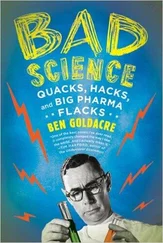Ben Goldacre - Bad Science
Здесь есть возможность читать онлайн «Ben Goldacre - Bad Science» — ознакомительный отрывок электронной книги совершенно бесплатно, а после прочтения отрывка купить полную версию. В некоторых случаях можно слушать аудио, скачать через торрент в формате fb2 и присутствует краткое содержание. Жанр: Публицистика, на английском языке. Описание произведения, (предисловие) а так же отзывы посетителей доступны на портале библиотеки ЛибКат.
- Название:Bad Science
- Автор:
- Жанр:
- Год:неизвестен
- ISBN:нет данных
- Рейтинг книги:5 / 5. Голосов: 1
-
Избранное:Добавить в избранное
- Отзывы:
-
Ваша оценка:
- 100
- 1
- 2
- 3
- 4
- 5
Bad Science: краткое содержание, описание и аннотация
Предлагаем к чтению аннотацию, описание, краткое содержание или предисловие (зависит от того, что написал сам автор книги «Bad Science»). Если вы не нашли необходимую информацию о книге — напишите в комментариях, мы постараемся отыскать её.
Bad Science — читать онлайн ознакомительный отрывок
Ниже представлен текст книги, разбитый по страницам. Система сохранения места последней прочитанной страницы, позволяет с удобством читать онлайн бесплатно книгу «Bad Science», без необходимости каждый раз заново искать на чём Вы остановились. Поставьте закладку, и сможете в любой момент перейти на страницу, на которой закончили чтение.
Интервал:
Закладка:
But this is a curiosity and an aside. In the bigger picture it doesn’t matter, because overall, even including these suspicious studies, the ‘meta-analyses’ still show, overall, that homeopathy is no better than placebo.
Meta-analyses?
Meta-analysis
This will be our last big idea for a while, and this is one that has saved the lives of more people than you will ever meet. A meta-analysis is a very simple thing to do, in some respects: you just collect all the results from all the trials on a given subject, bung them into one big spreadsheet, and do the maths on that, instead of relying on your own gestalt intuition about all the results from each of your little trials. It’s particularly useful when there have been lots of trials, each too small to give a conclusive answer, but all looking at the same topic.
So if there are, say, ten randomised, placebo-controlled trials looking at whether asthma symptoms get better with homeopathy, each of which has a paltry forty patients, you could put them all into one meta-analysis and effectively (in some respects) have a four-hundred-person trial to work with.
In some very famous cases – at least, famous in the world of academic medicine – meta-analyses have shown that a treatment previously believed to be ineffective is in fact rather good, but because the trials that had been done were each too small, individually, to detect the real benefit, nobody had been able to spot it.
As I said, information alone can be life-saving, and one of the greatest institutional innovations of the past thirty years is undoubtedly the Cochrane Collaboration, an international not-for-profit organisation of academics, which produces systematic summaries of the research literature on healthcare research, including meta-analyses.
The logo of the Cochrane Collaboration features a simplified ‘blobbogram’, a graph of the results from a landmark meta-analysis which looked at an intervention given to pregnant mothers. When people give birth prematurely, as you might expect, the babies are more likely to suffer and die. Some doctors in New Zealand had the idea that giving a short, cheap course of a steroid might help improve outcomes, and seven trials testing this idea were done between 1972 and 1981. Two of them showed some benefit from the steroids, but the remaining five failed to detect any benefit, and because of this, the idea didn’t catch on.

Eight years later, in 1989, a meta-analysis was done by pooling all this trial data. If you look at the blobbogram in the logo on the previous page, you can see what happened. Each horizontal line represents a single study: if the line is over to the left, it means the steroids were better than placebo, and if it is over to the right, it means the steroids were worse. If the horizontal line for a trial touches the big vertical ‘nil effect’ line going down the middle, then the trial showed no clear difference either way. One last thing: the longer a horizontal line is, the less certain the outcome of the study was.
Looking at the blobbogram, we can see that there are lots of not-very-certain studies, long horizontal lines, mostly touching the central vertical line of ‘no effect’; but they’re all a bit over to the left, so they all seem to suggest that steroids might be beneficial, even if each study itself is not statistically significant.
The diamond at the bottom shows the pooled answer: that there is, in fact, very strong evidence indeed for steroids reducing the risk – by 30 to 50 per cent – of babies dying from the complications of immaturity. We should always remember the human cost of these abstract numbers: babies died unnecessarily because they were deprived of this life-saving treatment for a decade. They died, even when there was enough information available to know what would save them , because that information had not been synthesised together, and analysed systematically, in a meta-analysis.
Back to homeopathy (you can see why I find it trivial now). A landmark meta-analysis was published recently in the Lancet . It was accompanied by an editorial titled: ‘The End of Homeopathy?’ Shang et al . did a very thorough meta-analysis of a vast number of homeopathy trials, and they found, overall, adding them all up, that homeopathy performs no better than placebo.
The homeopaths were up in arms. If you mention this meta-analysis, they will try to tell you that it was a stitch-up. What Shang et al . did, essentially, like all the previous negative meta-analyses of homeopathy, was to exclude the poorer-quality trials from their analysis.
Homeopaths like to pick out the trials that give them the answer that they want to hear, and ignore the rest, a practice called ‘cherry-picking’. But you can also cherry-pick your favourite meta-analyses, or misrepresent them. Shang et al . was only the latest in a long string of meta-analyses to show that homeopathy performs no better than placebo. What is truly amazing to me is that despite the negative results of these meta-analyses, homeopaths have continued – right to the top of the profession – to claim that these same meta-analyses support the use of homeopathy. They do this by quoting only the result for all trials included in each meta-analysis. This figure includes all of the poorer-quality trials. The most reliable figure, you now know, is for the restricted pool of the most ‘fair tests’, and when you look at those, homeopathy performs no better than placebo. If this fascinates you (and I would be very surprised), then I am currently producing a summary with some colleagues, and you will soon be able to find it online at badscience. net, in all its glorious detail, explaining the results of the various meta-analyses performed on homeopathy.
Clinicians, pundits and researchers all like to say things like ‘There is a need for more research,’ because it sounds forward-thinking and open-minded. In fact that’s not always the case, and it’s a little-known fact that this very phrase has been effectively banned from the British Medical Journal for many years, on the grounds that it adds nothing: you may say what research is missing, on whom, how, measuring what, and why you want to do it, but the hand-waving, superficially open-minded call for ‘more research’ is meaningless and unhelpful.
There have been over a hundred randomised placebo-controlled trials of homeopathy, and the time has come to stop. Homeopathy pills work no better than placebo pills, we know that much. But there is room for more interesting research. People do experience that homeopathy is positive for them, but the action is likely to be in the whole process of going to see a homeopath, of being listened to, having some kind of explanation for your symptoms, and all the other collateral benefits of old-fashioned, paternalistic, reassuring medicine. (Oh, and regression to the mean.)
So we should measure that; and here is the final superb lesson in evidence-based medicine that homeopathy can teach us: sometimes you need to be imaginative about what kinds of research you do, compromise, and be driven by the questions that need answering, rather than the tools available to you.
It is very common for researchers to research the things which interest them, in all areas of medicine; but they can be interested in quite different things from patients. One study actually thought to ask people with osteoarthritis of the knee what kind of research they wanted to be carried out, and the responses were fascinating: they wanted rigorous real-world evaluations of the benefits from physiotherapy and surgery, from educational and coping strategy interventions, and other pragmatic things. They didn’t want yet another trial comparing one pill with another, or with placebo.
Читать дальшеИнтервал:
Закладка:
Похожие книги на «Bad Science»
Представляем Вашему вниманию похожие книги на «Bad Science» списком для выбора. Мы отобрали схожую по названию и смыслу литературу в надежде предоставить читателям больше вариантов отыскать новые, интересные, ещё непрочитанные произведения.
Обсуждение, отзывы о книге «Bad Science» и просто собственные мнения читателей. Оставьте ваши комментарии, напишите, что Вы думаете о произведении, его смысле или главных героях. Укажите что конкретно понравилось, а что нет, и почему Вы так считаете.





![Роман Зыков - Роман с Data Science. Как монетизировать большие данные [litres]](/books/438007/roman-zykov-roman-s-data-science-kak-monetizirova-thumb.webp)






